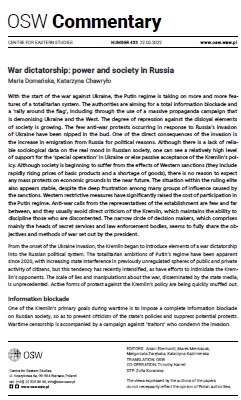War dictatorship: power and society in Russia
War dictatorship: power and society in Russia
Author(s): Katarzyna Chawryło (Jarzyńska), Maria Domańska
Subject(s): Government/Political systems, Military policy, Political behavior, Politics and society, Studies in violence and power, Geopolitics, Peace and Conflict Studies, Russian Aggression against Ukraine
Published by: OSW Ośrodek Studiów Wschodnich im. Marka Karpia
Keywords: Russia; Society; information blockade on
Russian society; Kremlin’s propaganda offensive; suppression of anti-war protests;
Summary/Abstract: With the start of the war against Ukraine, the Putin regime is taking on more and more features of a totalitarian system. The authorities are aiming for a total information blockade and a ‘rally around the flag’, including through the use of a massive propaganda campaign that is demonising Ukraine and the West. The degree of repression against the disloyal elements of society is growing. The few anti-war protests occurring in response to Russia’s invasion of Ukraine have been nipped in the bud. One of the direct consequences of the invasion is the increase in emigration from Russia for political reasons. Although there is a lack of reliable sociological data on the real mood in Russian society, one can see a relatively high level of support for the ‘special operation’ in Ukraine or else passive acceptance of the Kremlin’s policy. Although society is beginning to suffer from the effects of Western sanctions (they include rapidly rising prices of basic products and a shortage of goods), there is no reason to expect any mass protests on economic grounds in the near future. The situation within the ruling elite also appears stable, despite the deep frustration among many groups of influence caused by the sanctions. Western restrictive measures have significantly raised the cost of participation in the Putin regime. Anti-war calls from the representatives of the establishment are few and far between, and they usually avoid direct criticism of the Kremlin, which maintains the ability to discipline those who are discontented. The narrow circle of decision makers, which comprises mainly the heads of secret services and law enforcement bodies, seems to fully share the objectives and methods of war set out by the president.
Series: OSW Commentary
- Page Count: 8
- Publication Year: 2022
- Language: English
- Content File-PDF

